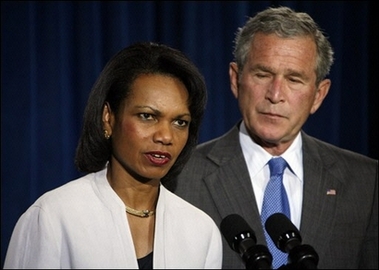CRAWFORD, Texas - The White House said Wednesday neither Israel nor Hezbollah
should escalate their month-old war, as Israel decided to widen its ground
invasion in southern Lebanon.

US President George W.
Bush (R) looks on as US Secretary of State Condoleezza Rice speaks during
a press conference from the Bush ranch in Crawford, Texas on August 7.
Arab ministers were to make Lebanon's case before the UN Security Council,
as debate continued on a draft French-US resolution calling on Israel and
Hezbollah to stop fighting.[AFP] |
White House press secretary Tony Snow said the U.S. message was for both
sides, though his remarks came after Israel's Security Cabinet voted to expand
the war effort in an attempt to deal further blows to Hezbollah.
"We are working hard now to bridge differences between the United States
position and some of the positions of our allies," Snow told reporters in Texas,
where President Bush was vacationing. "We want an end to violence and we do not
want escalations."
Meanwhile, rifts over a plan to stop the fighting delayed approval of a
resolution at the U.N. Security Council. The U.S. and France were offering
competing versions.
France proposed new language on a cease-fire and Israeli pullout, but the
Americans rejected it out of concern that the Lebanese could not assert control
over Hezbollah strongholds in the south without help from a robust international
force.
"The Lebanese army, while an absolutely essential part of any solution, is
not itself independently capable of dealing with the problem, at least not yet,"
Snow said.
He said the United States was working on another draft resolution, but he
would not estimate when a vote might be possible.
"I think at this point it's beyond any of us to come up with a firm
prediction about when you get a resolution," he said.
U.S. and French diplomats had been hoping for a vote on the draft early this
week. But the differences between the co-sponsors meant that a Security Council
vote on the resolution to try to end the fighting would be delayed at least
until late Thursday.
"I know from the outside, diplomacy looks a bit like a mosh pit, but there is
actually a structure and order to the discussions," State Department spokesman
Sean McCormack said in Washington.
Neither McCormack nor Snow would talk in detail about disagreements at the
U.N. or how the United States was negotiating to solve them.
"The question is whether the United States and its allies can bridge those
gaps," Snow said. "We're not declaring an impasse here."
In Washington, other U.S. officials said negotiators have the framework of a
deal that could address Lebanese, Arab and French concerns over the timing of an
Israeli withdrawal. Lebanon and other Arab nations have demanded an immediate
pullout.
As a practical matter, Israeli forces would need several days or longer to
leave, and the departure would be coordinated with deployment of a replacement
force that is acceptable to the Lebanese, U.S. officials said. They spoke only
on condition of anonymity as the discussions were continuing.
The composition and mandate of the replacement force is also a sticking point
in the Security Council negotiations over a cease-fire proposal, but U.S.
officials said it could be a combination of Lebanese and foreign forces, perhaps
under the banner of an existing United Nations peacekeeping force.
Bush talked to British Prime Minister Tony Blair on the phone for 20 minutes
Wednesday, and U.S. diplomats have been calling other foreign leaders and
updating the president.
"I dare say the president's very actively engaged in this," Snow said. "He
may go for a bike ride in the morning, but he's spending a lot of time, morning,
noon and night working these issues."
The United States has been Israel's strongest supporter during its
cross-border war with Hezbollah, an Islamic political and military movement that
had held de facto control of southern Lebanon along the Israeli border. The
fighting began after Hezbollah crossed the border and killed and kidnapped
Israeli soldiers.